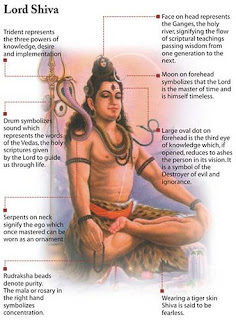Lord Shiva and Shravan Month
The month of Shravan is the fifth month of the Hindu calender
beginning from Chaitra, and is the most auspicious month of the Chaturmas. On
Purnima or fullmoon day, or during the course of the month the moon transits to star 'Shravan'
rules the sky, hence the month is called Shravan. This month is spread out with
innumerably religious festivals and ceremonies and almost all the days of this
month are auspicious.
In north India Shravan began from the Guru Poornima (July 2) when Moon transits Shravan Nakshtra. As per Vikram Samvat calendar which is based on Lord Sun's (Solar) transit in 12 Rashi's, Shravan begins in mid July when Lord Sun transits to Cancer, the zodiac ruled by the Moon. In Maharashtra and many other parts of India who follow Sak Samvat Calender Shravan begins after Amavas is over, which was on July 20 this year.
Shravan is considered the holiest month of the year. Each monday of this month, known as Shravana Somvar, is a special day in Shiva temples where the dharanatra hangs over the linga or the idol to bathe it with holy water, day and night. Devotees pile the linga high with Bel leaves and flowers and fast till sunset. The nandadeep (24 hour lamp) burns steadily in the temples.
Shravan is considered the holiest month of the year. Each monday of this month, known as Shravana Somvar, is a special day in Shiva temples where the dharanatra hangs over the linga or the idol to bathe it with holy water, day and night. Devotees pile the linga high with Bel leaves and flowers and fast till sunset. The nandadeep (24 hour lamp) burns steadily in the temples.
The legend says that when the churning of
oceans - Samudra Manthan - took place in the month of Shravan,
fourteen different types of rubies came out. Thirteen of these were distributed among the deva's and demons, except Halahal (poison). Lord Shiva drank the Halahal and stored it in his throat. Hence
the name Neelkantha (meaning blue throat) is attributed
to Shiva.
To reduce the
strong effect of poison, Lord Shiva wore the crescent moon on his head. All the
Gods, thereafter started offering the Ganges
water to Lord Shiva to make lessen the effect of poison. Since, this
happened in the month of Shravana, since then the Shiva devotees offer the Ganges water in this month.
It is considered highly auspicious to wear a
rudraksha in Shravan month. As, Mondays or Somvars of Shravan month are
specially observed with austerity. All Mondays are devoted to the worship of
Shiva as this day is sacred to Lord Shiva. No other Mondays of other months are
so greatly honoured.
Things to do during Shravan
month
• Wear Rudraksh, and also use a Rudraksh mala for
Japa.
• Offer Lord Shiva
Bhibhuti and place some on your forehead.
• Make offerings of
Bel leaves, Panchamrut (milk, yoghurt, clarified butter, honey and jaggery) on
Shiva Ling.
• Recite Shiv Chalisa and Aarti.
• Chant Maha
Mrityunjaya Mantra.
• Fasting on
Mondays. Girls who fast on all Mondays of Shravan get a good husband.
Shravan Somvar Vrat (Monday fasting on Shravan month)
One of the name of
Lord shiva is soma - saha uma. For the Lord someshvara Who wears the soma, the
moon crescent on the matted hair, on the somavara day (Monday), this festival
is observed.
Though all Mondays
can be observed as vrat there are special mondays when it is much more
emphasised to observe like the shravan Somvar and karthikai sOmavAr. According
to skandha purANa, on the Mondays of the month kArthikai (mid Nov to mid Dec)
this vrata is observed.
Way of observing
After taking bath
pray to the Auspicious and Graceful Lord Shiva. Anointing the Lord with Panchamritam and other pleasant substances, hail the Lord offering bilvapatra leaves. During the day don't take any solid food. You can take Milk/ buttermilk/
fruit juice/ fruits . After Sun Set in the evening pray to Lord Shiva and
break your
Significance of Shravan Weekdays
Each day in the month of
Shravan has a special significance and has its own ritual.
Monday: is the day of Lord Shiva worship.
Tuesday: Gauri is worshipped in every home, by women for the good health
of their family.
Wednesday: are dedicated
to Vithala, a form of Vishnu or Thursday: are also days for worshipping Buddh and Guru.
Friday: every home worships Lakshmi and Tulsi.
Saturday: are for Saturn (Shani). It is also known as Shravan Saturdays, with the object of object of obtaining wealth. These days are known as Sampat Sanivara (wealth Saturdays).
Sundays: are meant worshiping the Sun god. Sun worship was general in the Vedic period and even now it is so. Especially in Shravan, every Sunday the Sun is worshiped without fail.
During this month people practice many rules and regulations while praying and also fast. Shravan has a special importance as it ushers in a host of auspicious days and festivals like:
Naga-Panchami
Kalkyavatara Putradaikadashi Hindola or Swinging Narali Purnima
Shravani Purnima
Pavitraropana Raksha Bandhan |
Vara Lakshmi Vrata
Rishi Panchami Govatsa and Bahula Sitala Saptami Janmashtami Ajaikadasi Pithori Pola |










Hi nice blog you have shared such a useful information regarding how to deal with
ReplyDeletefestival in the month of sawan keep writing.